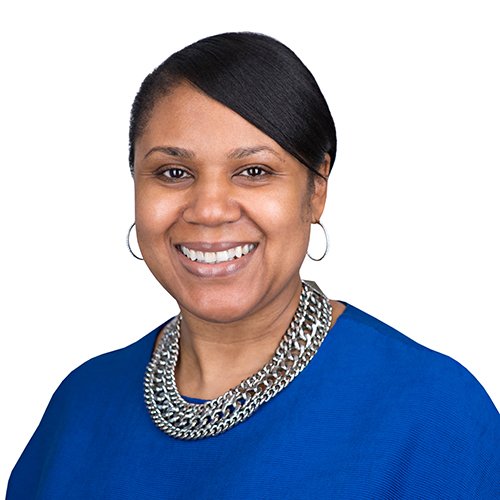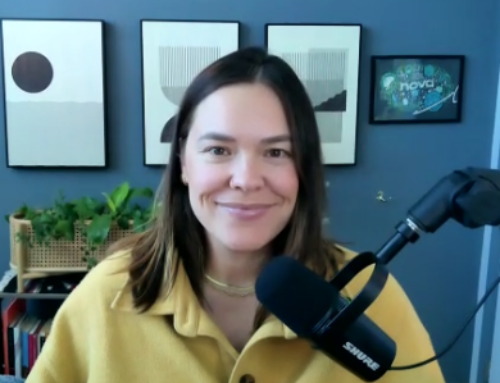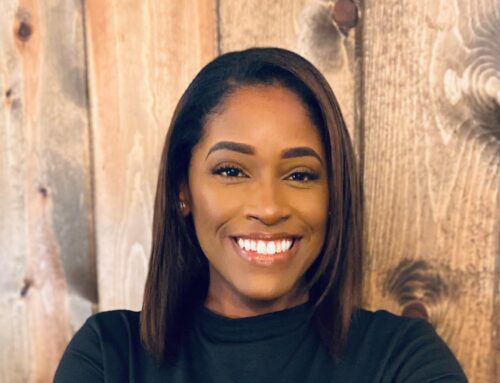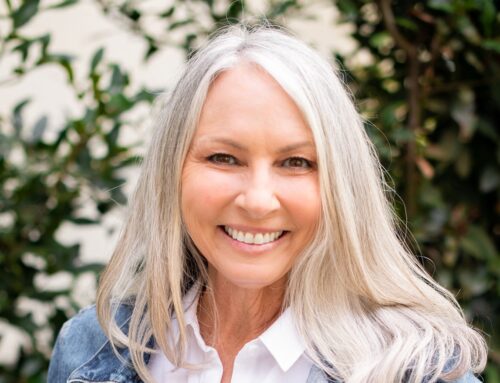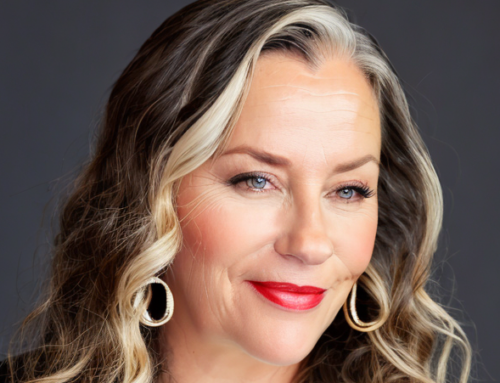Simone White has worked in the administrative profession for nearly 25 years. She is the global chair of GAIN – Global Administrative Initiative Network at BlackRock, supporting nearly 500 professionals across APAC, EMEA, and Americas.
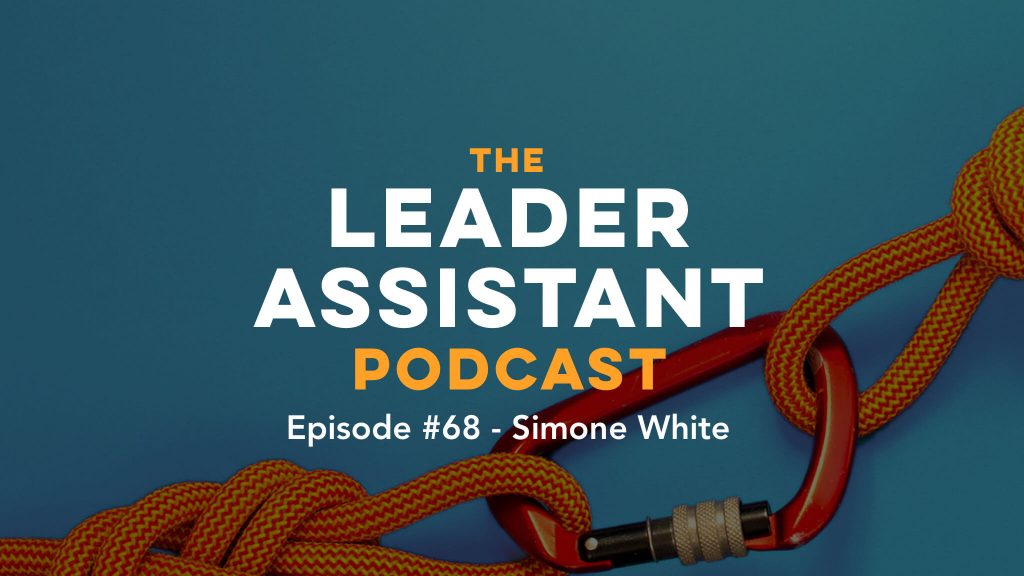
I had the pleasure of speaking at an event with Simone in Frankfurt, Germany a couple of years ago, and I’m so thrilled to have her on the podcast!
Simone talks about how we can help our companies value the role of an assistant, owning your role, how their large organization welcomes new assistants to the team, and lessons from her work building global networks of support for different groups within BlackRock.
LEADERSHIP QUOTE
If your actions inspire others to dream more, learn more, do more and become more, you are a leader.
– John Quincy Adams
CONNECT WITH SIMONE
ABOUT SIMONE
Simone White has worked within the administrative profession for nearly 25 years. Her experience spans both the public and private sectors working with executive teams at all levels. For the past six years Simone has shared her passion for administration with assistants, supporting peers via mentoring and speaking at conferences in both the UK and Europe. Simone founded the EMEA assistant network at BlackRock. In April 2018 the network expanded globally with chapters in EMEA, the Americas and in APAC. Simone supports assistants both internally and externally to elevate the role of the administrative profession and works with stakeholders to align administrative practice to the benefit of all.
THE LEADER ASSISTANT BOOK
Download the first 3 chapters of The Leader Assistant: Four Pillars of Game-Changing Assistant for FREE here or buy on Amazon here.
JOIN THE COMMUNITY
Join the Leader Assistant Slack Community here, or the Facebook Group here for bonus content and to network with other assistants who are committed to becoming leaders!
SUBSCRIBE
Subscribe to The Leader Assistant Podcast so you don’t miss new episodes!
You can find the show on Apple Podcasts, Spotify, Google Podcasts, Pandora, and Stitcher.
Join my email list here if you want to get an email when a new episode goes live.
LEAVE A REVIEW
If you’re enjoying the podcast, please take 2 minutes to rate and review the show on Apple Podcasts here. Each review helps me stay motivated to keep the show going!
—
EPISODE TRANSCRIPT
Simone White 0:00
Hi, I’m Simone White. Today’s leadership quote comes from John Quincy Adams. If your action inspires others to dream more, learn more, do more and become more. You are a leader.
Podcast Intro 0:18
The Leader Assistant Podcast exists to encourage and challenge assistants to become confident game changing leader assistants.
Unknown Speaker 0:28
Thank you so much for listening all I’m old, you’re listening to Episode 68.
Jeremy Burrows 0:35
Hey, friends, thanks for tuning in. I’m excited to share my conversation with Simone White. But first, I wanted to thank everyone for an awesome launch week for my book, hit number one on a couple rankings and just grateful for everyone who reached out and said they enjoyed the book so far. And for everyone who purchased the 99 cent Kindle deal, or order the paperback and so on. Thank you so much for your support. I really, really appreciate it. And I hope the book is very, very helpful for you. Of course, if you haven’t had a chance to grab a copy, you can check out the first three chapters for free at leaderassistantbook.com. Or order the book on Amazon, Barnes and Noble, or wherever you like to purchase books. Thanks again for your support. And here is the interview with Simone. Hey, everyone. Thanks for tuning in to The Leader Assistant Podcast. It’s your host, Jeremy Burrows. And today I’m speaking with Simone White, all the way on the other side of the world, Simone, how are we doing?
Simone White 1:37
I’m good. Thanks, Jeremy, nice to be able to join you today.
Jeremy Burrows 1:41
We got to speak at the same conference. And you got to meet my wife who says Hi, by the way. Yeah, it’s just a fun, fun to meet you and hear about your story. So I’m very excited today to share your story with my listeners. So let’s, let’s jump right in and hear a little bit of your backstory. What was your very first job? And what skills did you learn in that role that you still use today?
Simone White 2:08
It’s really interesting. So my very first job was in a department store. I was 15. And three months, I remember exactly because that was the legal age, I was able to work and get paid officially. And it was within a toy department. It was great. Simply because one I got to play with all the latest new toys, computer games, etc. But it was customer service orientated. So the customer is always right. So you had to learn how to deal with people who were lovely, and people who were not so lovely. So I learned very early on about emotional intelligence. Not that I knew it was that then it was just learning how to deal with different personalities. And it’s something that I still use today.
Jeremy Burrows 2:58
Awesome. Yeah, I worked at Walmart. And my brother worked in the toy department right next to me. So it was always fun. Hey, here’s this new toy that came in
Simone White 3:08
this new Cozy Coupe that I could still fit in and drive across the floor at the time. So yeah.
Jeremy Burrows 3:15
Awesome. So how did you kind of progress from there and ended up eventually becoming an executive assistant?
Simone White 3:24
Well, I took that job as a Saturday job. So it was something that I did just to earn extra cash while I was going through school. And then I actually graduated in something quite far removed to what I do today. So I graduated in fashion journalism and promotion. When I was decided what I wanted to do as a career. At school, I knew that I didn’t want to go out and work straightaway. So I asked my mum for some career advice, and my mom’s career advice to me was Simone people will always need clothes. And at the time, the two things that I really enjoyed were music and fashion. And with her advice, I thought okay, then people always need clothes. Let me learn how to design and make them from scratch. So that took me to the London College of Fashion, where I studied how to make a garment from scratch. And whilst I was there, I realized that there was this whole world and a whole organization of people who their day job was to put on fashion shows. So my final two years of study was studying just how to do that. So I learned how to do catwalk shows or the organization behind it. And when I graduated, although it was great doing all of that stuff go to in London Fashion Week in Paris Fashion Week. If I also knew at that time, and I think I must have been 25 that I live in that world continuously, I couldn’t see myself doing that every single day. It’s quite a, I don’t want to use the word pretentious, but it’s, it’s a world where you’re not always yourself. So you spend a lot of time being super nice to people who might not even like. And I didn’t know if I could do that continuously. So after I graduated, I needed money. With the journalism skills that I had, I’ve learned how to tie up how to take minutes how to deal with people, I joined a couple of recruitment agencies. And the first job that they offered me was at well known Museum in London called the Victoria and Albert Museum. It was in their acquisitions department, and it was at a typist. And at that point, I had a very fast typing speed because of having to learn journalism. And it was also the reason why I took that job is I most probably spent at least once a week in the Victoria and Albert Museum, because they had beautiful garments, and they still do. And it’s where you learn about the history of fashion. So that was my introduction to be in, in the administration field by moving from the world of fashion and journalism into the acquisitions department at the v&a Museum.
Jeremy Burrows 6:36
So you basically went from being nice to people, you may not like to being nice to people you may not like as an assistant
Simone White 6:44
Exactly, but it made it a lot easier working in an office rather than managing shopping models on the catwalk.
Jeremy Burrows 6:54
Great. So what was the point when you thought, Okay, this assistant, job and role is really a career for me.
Simone White 7:07
It’s really interesting, because I didn’t think of it as a career. I only thought of what I do now as a career maybe seven or eight years ago. Before then it was a job that I loved that I did really well. So I always thought of myself as a really good assistant, I would be proactive in the way that I worked. I wanted to be loyal to my team, I would always do the very best. But I didn’t really look outside what I was immediately doing. So I didn’t know what was happening. Was there an industry for assistance? Were there events for assistance? I didn’t really think of it as a career, to be honest with you. It was just something that I did. I enjoyed, and I did it well. I would say it’s only been in the past seven or eight years that I’ve realized what I do is something that I can grow and be recognized in. And I now view it as a career. Which is strange, because I’ve been doing it for over 20 years.
Jeremy Burrows 8:17
So what would you encourage other assistants in when it comes to trying to kind of make that shift from this is just a job that I’m good at to this as a career that I can own and grow in?
Simone White 8:31
You make a really good point in that question, because you talk about owning something. And I think the very nature of our job as assistants sometimes makes it hard for us to think that we own something, because a lot of the time we are being reactive, or were responding to requests from others. And simply because of that we feel that we don’t own it, we don’t own what we do. And it’s only when you begin to understand that what we do as assistants or administrators, no matter your title that an organization gives you. You are the SME, you’re the subject matter expert at what you do. And what I found is that assistants often will not only ask for guidance on what they should be doing, but also how they should be doing it. And because of that, we don’t have that sense of ownership. So my mind shift change has been that when I’m working with teams or executive, I want to know what they want. But I provide them with the detail and the guidance as to how I’m going to do it, because that gives me a sense of ownership. And that makes me manage my career. And I think that’s a mindset that more and more assistants are having simply because of the waiver workforce is changing. But I think it’s one thing that we really need to start thinking about more in that we need to own what we do as assistants. And what we do supports others. Rather than thinking, my manager tells me and owns what I do. Because if that manager was to then leave, it kind of puts us in limbo, we’re then waiting for the next person to tell us what to do. Whereas if we own what we do, were the ones who have some form of control over it.
Jeremy Burrows 10:37
That’s great. So let’s say you get to where your mindset shifted, where you’re owning what you do. And you really want to grow and expand, how can an assistant grow existing skills and develop new skills?
Simone White 10:53
I think it all depends on where you are. There, there is a lot more help out there now for assistance to remain relevant. And I think that’s really important. If we look at what’s happening now. I know when I first started out at the v&a, I was using a typewriter with Wipeout or tip X. Whereas people don’t use that now. So for us to remain relevant, we need to keep up with technology. Otherwise, we could find that technology has taken over some of the things that we do. We also have to not fear technology. So if I think about the fact that my boss is currently in New York, she is her working hours, now I’m talking with you, I’m going to be offline for the next hour. I’m not fearing weapon if what what happens if she needs me or she can’t do something. Because of technology, technology has also allowed her to be self sufficient for when I’m not available at the touch of a button. But it also allows me to expand what I’m doing. So I can learn new technologies, which I can roll out to my team, which helps to support them, and gives me time back to be more involved. So we’ve got the team are doing. So although we all have core responsibilities, things that have to get done, and that we as a systems need to manage. If there is technology that allows us to gain some time back and allow some people to be a little more self sufficient with their time, we can really start thinking more strategically about the input and the impact we can make to our teams, because it’s impact and that visible impact that we make that enables us to grow, and also enables us to be recognized for what we’re doing.
Jeremy Burrows 12:47
Yeah, totally agree. That’s great. So when we met in Germany, last year, we were both speaking at a conference to European Central Bank. And it was great time you spoke on networking, and how you kind of have grown, you’re at BlackRock and you kind of grown a networking group and community there. So can you talk a little bit about the importance of being in a community of other EAS and then tips on how to network?
Simone White 13:20
Definitely, I think networks is something we see a lot of in organizations. I know in my own we have a women’s network, we have families that that rock, we have out network. So organizations really understand the importance of networks. And most of the time as assistants we do network, but not formally. And I think the power of a formal network cannot be understated or underestimated. So having a formal network, if possible within your organization can really help you to move the dial. And the reason why I say that is Blackrock is a really large organization. So for individuals to have their voice heard can be quite hard. But if individuals who all have the same thought, or who all do the same job get together as a collective, it’s a much more powerful voice. And it’s the reason why the network grew here at Black Rock. So we started in a mayor originally, and that was back in 2013. So we launched a network in a mayor called ACE at the time, it stood for assistant community in there. And that supported the 100. And I think it was 32 assistants across the Emir wide offices. And what was really nice was that we could have have issues in London but they were having in our Paris office or they had in our Copenhagen office. But if the assistance didn’t have a way, or somewhere centrally to communicate that, it could take a while solution to come about. But once we created that network, and not only connected between assistance, but also connected with what we call stakeholders, so with our AV departments, or with expenses or with travel, anytime we had an issue, or we had an idea, we could reach out to those stakeholders and say, this could really help us as a community, which would impact the business, work with us. And that’s what started to happen. And that’s how they Aamir network grew. And at the same time, I think our West Coast in the West Coast of the US in San Francisco, they had started a network so completely independently. And then the East Coast started a network completely independently. So we had three networks that the regions knew about, but we didn’t know about globally. And we started to connect regionally. And then back in 2016, there were things happening, and we thought, actually, it’d be more powerful to speak globally, because these were things that were affecting assistance globally. And that’s how game was formed. And I became the Chair of the global network, which is now game, and is making tremendous strides in really supporting assistance at Black Rock. I think one of the things that we were able to do this year, on a global basis, in conjunction with HR is roll out a program of assisting assistants to understand the importance of SMART objectives, and know what that looks like at BlackRock. So assistance would have the ability to understand how they create smart objectives for themselves. But not only did it go to the assistants, it also went to all of the HR business partners, so that when a manager might say, it’s that time of year, I’d really like some advice on how to help my assistant, there was immediately a talking point deck that they could share. And we’ve had feedback from assistants to say that that’s helped tremendously. So it’s really important to realize that, as a group of assistants, we are so much more powerful. If we are a group, and if we’re speaking in unison, we might not always agree. But if we’re talking together to try and provide solutions, that enables the company to actually see us rather than a silo, as a group.
Jeremy Burrows 17:44
Yeah, you know, that’s brings out one of my other questions I was going to ask is how can we help executives and HR departments value assistance? And it sounds like your global administrative initiative, network gain is really doing that? Because it’s like you said, it’s coming together as a group and valuing the assistance each other and then the company seems to have embraced that. Is that right?
Simone White 18:10
Definitely. I think it’s one of those things that if you ask most people, and sometimes even if you ask an assistant, tell me what you do. The first things that tend to come out of their mouth is that they manage the diary of someone or they are the support person. But to really articulate what we do is quite hard. And if we find it difficult as the person doing the role, how much more so do HR or managers. So by creating guidance, and really trying to define how we support and the role that we play at BlackRock, it helps not only us as assistants, but it helps the wider business. And the growth of the network, I think and the way that the company has embraced it has really helped from where we started at the beginning. We are, we have a number of networks here. And we are part of that network. So we have something called Mosaic that oversees all of them. And we sit within that. So it really gives us that presence among the rest of the organization where people might not necessarily see us.
Jeremy Burrows 19:25
That’s great. So how many about how many assistants are in your global network?
Simone White 19:31
So we have 506 assistants globally, and it’s our network isn’t something that you need to join. Once you’re an assistant at Black Rock, you’re automatically a part of it. And how it works is that whatever programming is happening regionally, so we’re organized globally, so I sit as global chair. We also have a series of senior managing directors who are our sponsors, but then within Each region, so in APAC, in a Nia. And in the Americas, there are regional steering committees. And each steering committee, we work against the same global framework that we create for ourselves. But everybody’s experiences are different because of regional differences because of what is required in each region. So the regional teams, they work on programs for their region. So globally, it’s only if we’re doing really big projects, or if the company is changing things that need to roll out globally. So every assistant it’s going to change for, that’s where the organization sits under me. And the strategy sits under me. But regionally, it’s really nice for the regional offices to say, we need more training in this particular area, and they will work on that. And then it’s up to the individual assistants in that region, either to say, Yes, this is something that I really want to do, or for them to say, actually, I don’t really need to, I don’t really need that. But everybody is automatically a part of the game network once they’re in a system at BlackRock.
Jeremy Burrows 21:09
So when a new assistant signs on, they are automatically added, what’s something that what’s kind of their orientation process? Or how do you help new assistants feel like they belong.
Simone White 21:21
So this is something that we’re still in progress with, as we went global just over a year ago. So from a global perspective, we are just finalizing now a global onboarding deck. And this is guidance around the million and one things that you need to know as an assistant to support everybody else within the business. So that’s been rolled out globally, and how we’re having to do it, because we have so many different offices around the globe. And they’re, what the office provides is so different. We’ve tried to do an overall guide to our systems that are global. And then within those materials. So for instance, in a Mia, we then have separate pages for the Paris office, or the Budapest office or for Copenhagen. And that really digs down into further detail. And we’re doing that in the Americas. And we’re also doing it in APAC, being global means that we’re often sending our executives across the globe, and the way that they interact or what they need in those offices can be completely different. So the the one day, home base isn’t. So having things simple things like how a desk is organized, or an office is organized. If I send my executive to Hong Kong was really important. The security protocols can be completely different than if they were coming into the London office. So that’s one thing that we’re trying to roll out globally. In a meal when we rolled out the onboarding program. Originally, what we did was, each new assistant received a welcome pack. And it’s something we’re doing, we’re trying to roll out globally now. And in that welcome pack, they we all have corporate ID cards that we need to carry around. And in our building, for instance, so the building that I sit in, there are 101 assistants in this building across 10 floors. So it’s very easy for me to get into a lift with a group of people and not know that out of that group of 10. Three of them may be assistants. So it could be quite isolated in that respect. So it was something that was happening in our IT department that we picked up on. So in our IT department, every day, we would have IT specialist walk the floor, and they had read Len yards so that if you were having an IT issue, you could actually see somebody with a red lanyard and ask them for help. And we thought that was such a really easy way to identify someone. So in the mail, what we did was we created a lanyards for badge holders, and it had our logo, and it was in the branding colors. And we would wear it. So if we stepped to the left and saw somebody else wearing that we knew they were an assistant and it was a really good way to start a conversation. So we’re trying again to think of new ways now that we’ve gone global, that will work across all offices so that people are welcomed on day one they introduced to the steering committee who their regional steering committee are, they know that they have a network so that there’s always not just maybe one individual who they’ve been said this person is going to show you around, but there’s 504 of us globally who they can reach out to.
Jeremy Burrows 24:50
That’s great. It’s amazing. Yeah, it makes me want to join your team.
Simone White 24:55
Jeremy, we’re just happy with the diversity
Jeremy Burrows 25:01
So if you could snap your fingers and instantly give all assistance more of something, what would it be?
Simone White 25:08
Confidence. I think as assistants, we have confidence when our executives have told us to do something. But we don’t have the confidence I found to advocate for ourselves. It I guess it often also comes in line with loyalty, we are so loyal to our team sometimes that we forget to be loyal to ourselves. And it’s really important to have confidence to ask for training, to have the ability to say, I’ve got a lot on right now, it’s not that I don’t want to do it. It’s just I can’t do it right now. We need to stop saying yes all the time and taking everything on board. Because by doing that, we often we might be efficient in getting work out. But we’re not effective in the way that we do it. So I think having given assistants confidence to be more confident in their role, and what they bring to the table could really help our profession.
Jeremy Burrows 26:12
I agree. Love it. So what, let’s talk a little bit about your career as an assistant, what is maybe the one of the biggest mistakes you’ve made? And what did you learn from the experience?
Simone White 26:26
Saying yes, all the time. It’s, I think it’s natural that we want to help everybody. And it’s fine if you are supporting, or it may be fine if you’re supporting one individual. But if you’re supporting 10, or 15, or 20, or 30, you cannot say yes all the time. And by saying no, it’s not an indication that you don’t want to help. It’s an indication that you’re managing your time effectively. And it’s understanding that I want to help you, but I can’t right now. But I’ll let you know how you might be able to do this for yourself. So I got to the point where I say yes, all the time. And then I would be stressing because I have too many deadlines to meet. And then because I had so many deadlines, I would make mistakes. I remember, the mistake was never caught because I caught the mistake in time. But it just so happened that I was booking Eurostar travel for an executive. And it was one of those months where the day and day of the month were exactly the same in the March and April. And I ended up booking the travel tickets for the wrong month. And it just so happened that the day before I was looking at it, and I caught the mistake. So it didn’t impact the executive. But if I if I had stopped trying to get so many things done, and allowed myself the time to double check, I wouldn’t have that problem. Now, you won’t always have the time to double check what goes in peaks and flows. And it’s something that I am still trying to. It’s not something I’ve overcome. I’m still learning this skill. But it’s something I constantly having to remind myself that my role here is not to say yes to everybody. My role is to effectively and efficiently help manage the team. And I can only do that by fully understanding what’s on my plate and how I can get that done. And that’s by learning how to say no on occasion.
Jeremy Burrows 28:53
Great. So what makes an assistant, a leader?
Simone White 29:00
This I’ve learned over the past couple of years. And it’s why I like that leadership quote from John Quincy Adams. Often we think of leaders as being those who are at the top of a corporate structure, or those who have the ability to tell others what to do. What I found is that if what you do encourages somebody else, to do something differently, and to make a change. And if you are actively trying to help others do better, that makes you a leader. So you can be an assistant and be a leader. It’s there are especially within Information Administration, you can set precedence around administration. You don’t need to wait for somebody else to give you the authorization to do that. If you see that something is fundamentally not working, suggests how it can be changed, and then run with that. You If you need to get approval because it’s a big change, you get the approval. But that’s something you can work on. That’s something that you own. And that makes you a leader in that space.
Jeremy Burrows 30:12
It’s great. So what’s you know, you’ve, you’ve got this global, your global chair of this global assistant network, and you’re providing resources, what’s one book or resource that you would recommend to all assistants?
Simone White 30:29
There is so much out there. I’ll have to start off actually by saying listening to your podcast, because it’s the thing that I do. I listen to your podcasts on my commute on the way into work. And I find it easier to listen to a podcast than I would in trying to pick up a book, because I work full time. And I have two children and a household to run. So anytime that I do have once I’ve left, the building is normally really precious. And my commute is time that is literally mine. It’s only 15 minutes on the train, and then 15 minutes walk, but that half an hour, I can listen to one of your podcasts and the variety of people that you have, you get so many different perspectives.
Jeremy Burrows 31:20
Well, I just want to say thank you. And I want to say that I’m not paying you to say that.
Simone White 31:25
I promise Jeremy’s not paying me. He’s not paying me to say this. I think the other thing is LinkedIn. I learned so much from LinkedIn. So the other thing that I do so normally, it’s a podcast in the morning, and on my commute back home, I scroll through LinkedIn. And I’ve added different I follow different people on LinkedIn, different people, different organizations. And then I just read, and there’s so many people’s often put quotes on there. So I can’t say there’s one particular person that I follow. But I think LinkedIn is such a large resource. And there’s so many assistants out there who are providing so much information. Just if you haven’t got a profile on LinkedIn, create one and then just follow a couple of people. Twitter’s another place as well. But you can gain so much information just by following different organizations and becoming part of groups.
Jeremy Burrows 32:33
Yeah, I 100% agree LinkedIn is a goldmine. And if you’re not in, if you’re not on it yet, you’re doing yourself a disservice. Well, Simone, thank you so much for taking time out of your day to chat with me and share your tips and wisdom and your story. I really hope we can see each other in person again Sunday. But it’s been fun chatting and how how can we support what you’re up to? And where can my listeners find you online?
Simone White 33:04
Thank you, Jeremy, it’s been so great speaking with you, it’s been an honor to be a guest on your podcast. If people want to find me online, as I said, LinkedIn is great. Please feel free to reach out to me. I’m on LinkedIn, you’ll find me under Simone hyphen wipes. If you type in Black Rock, after that, I think you should be able to find me because the profile that LinkedIn name is quite long. I’m also on Twitter, and my handle is @Mrs_srwhite how people can help. I think our profession is going undergoing so much change right now. And if you are an assistant who’s thinking, I love what I do, I just don’t feel that people understand what I do, or that we don’t get the recognition for what I do make your voice heard somehow. Even if you don’t have a network within your organization, there is a very big network of assistants out there on LinkedIn, as I’ve mentioned, make your voice heard there. Because it’s only by us leading change that peep that change will be there. It won’t happen without us trying to push and strive for it. Were the ones who need to do that. So I think that would be my biggest ask.
Jeremy Burrows 34:24
Well, thanks again, Simone. And we’ll share all your social links on the show notes. So people can find you and say hi, and reach out and network. And yeah, hope you have a great one. And thanks again.
Simone White 34:36
Thanks so much, Jeremy.
Jeremy Burrows 34:38
Thanks again, Simone. What a great conversation. Check out the show notes at leaderassistant.com/68 And be sure to connect with Simone and say hi and have a great day and talk to you next time.
Unknown Speaker 35:09
Goburrows.com

